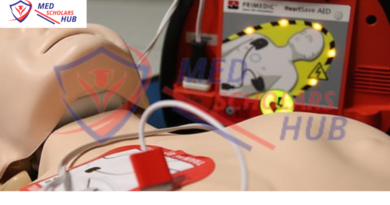Impact of General Practice Education for Nurses on Adult Lifestyle – Risk Reduction Strategies
Over the years, nursing, which is sometimes referred to as the center of healthcare, has seen tremendous changes.
The profession and its effects on the adult population have been significantly shaped by the evolution of General Practice education for Nurses.
A potent instrument for addressing many facets of adult living and putting into practice efficient risk reduction methods is the emphasis on general practice education for nurses.
We will examine how general practice education for nurses has changed, how it influences adult lifestyle decisions, and the concrete advantages it offers to adults’ general health and well-being as we go through the history of nursing education and practice.
Nursing Education Through the Ages
The historical background of nursing education is essential to comprehending the enormous impact of general practice education on adult lives.
In the past, nursing was frequently a casual family or communal activity.
However, Florence Nightingale, who is largely recognized as the father of modern nursing, arrived and the process of formalizing nursing education started in the 19th century.
Her focus on evidence-based practice lay the groundwork for nursing education’s future advancement.
The Birth of Specializations: Shaping the Nurse’s JDs
As nursing education developed, a number of specialties with distinctive foci arose. The field of general practice nursing, or GP nursing, has become important.
General practice nurses are prepared to offer comprehensive care with a focus on chronic illness management, disease prevention, and health promotion.
In nursing education, this specialty turned out to be a crucial turning point that had a big influence on how adults lived.
General Practice Education for Nurses
Because general practice education for nurses was so successful in treating a variety of adult health issues, it quickly became popular.
Nurses who complete this extensive training will be prepared to handle a variety of adult life issues, including diet, exercise, mental health, and chronic illness management. It’s not only about curing diseases; it’s also about giving folks the capacity to make wise lifestyle decisions that might lower their health risks.
Adult Lifestyle: A Complex Interplay
Diet, physical exercise, stress levels, sleep habits, and social relationships are just a few of the many variables that play a role in the adult lifestyle.
General Practice Education-trained nurses are equipped to evaluate and handle these areas in their entirety.
They are vital in informing individuals about the value of a healthy diet, regular exercise, and stress reduction methods.
By doing this, people not only improve their current health but also lower their long-term chance of developing chronic illnesses.

Nutrition as a Cornerstone for General Practice Nurses
A nutritious diet is frequently seen as the foundation of an active lifestyle. General practice nurses have received training in nutritional assessment, deficiency recognition, and practical advice on healthy eating.
Adults may learn from them how important a balanced diet is in lowering the risk of illnesses like obesity, diabetes, and heart disease.
Nurses in general practice have a significant role in influencing adult eating patterns through the development of individualized dietary programs and ongoing assistance.
Exercise and Physical Activity: Fostering Active Lifestyles
Another essential element of a healthy adult lifestyle is physical exercise. Common Practice Adults are urged by nurses to establish consistent exercise regimens that fit their unique requirements and interests.
These nurses stress the value of being active, whether it is through walking, swimming, or yoga.
They inform individuals about the advantages of physical activity for preserving a healthy weight, decreasing stress, and improving general wellbeing.
Mental Health and Stress Management
Adult lifestyles should be approached holistically, which includes managing stress and mental health.
General practice nurses are skilled in identifying the symptoms of mental health conditions like sadness and anxiety.
They provide direction on coping mechanisms, stress management approaches, and access to relevant mental health services.
By putting a strong emphasis on mental health, these nurses greatly improve the general standard of living for people.
Chronic Disease Management
Chronic illness management is one of the most important components of general practice education for nurses.
Numerous individuals deal with long-term illnesses including diabetes, hypertension, and asthma.
The management of these disorders can be helped by general practice nurses by ongoing monitoring, medication administration, and patient education.
These nurses lessen the dangers to long-term health linked with chronic diseases by enabling patients to manage their ailments.
The Nurse’s Role as an Educator
The heart of the nurse’s function in general practice is education. In addition to providing direct care, nurses also serve as educators, equipping individuals with the knowledge and skills they need to make wise lifestyle decisions.
Risk minimization is greatly helped by this educational component. Adults are more likely to adopt better behaviors when they are aware of how their activities affect their health.
Patient-Centered Care: Building Trusting Relationships
General Practice’s foundation The idea of patient-centered care is central to nursing.
In order to make sure that adult patients feel acknowledged and supported throughout their healthcare journey, nurses cultivate trustworthy connections with them.
Adults need to be trusted in order to be candid about their lifestyle choices and difficulties.
It enables nurses to offer specialized counsel and direction that is in tune with each patient’s particular requirements.
Community Engagement: Extending the Impact
Common Practice When organizing awareness campaigns and running health workshops, nurses frequently interact closely with local populations.
Through community involvement, their knowledge has an influence that goes beyond only the patients.
By engaging a larger audience, nurses help to build healthier communities where individuals are more conscious of the value of risk reduction techniques in their daily lives.
The Tangible Benefits: Improved Health Outcomes for Adults
There is no denying that general practice education for nurses has a positive influence on adult living.
These nurses assist in numerous ways to better adult health outcomes through their holistic approach. First off, they encourage healthy practices, which lowers the chance of chronic illnesses.
Second, they improve the quality of life for people by helping them efficiently manage pre-existing conditions.
Thirdly, they promote stress management and mental wellness, both of which are essential for good health.
Finally, they enable individuals to take control of their health, leading to a patient population that is more proactive and engaged.
A Personal Perspective of a General Practice Nurse
Let’s hear from someone who has devoted their career to this sector in order to fully comprehend the transforming effect of general practice education for nurses.
Having worked as a general practice nurse for more than 20 years, Sarah Davis offers the following perspective:
“As a general practice nurse, I’ve had the honor of watching the wonderful influence of education on adult lifestyles. I’ve observed patients who, with help and advice, transformed their eating patterns, started working out consistently, and mastered the art of efficiently managing their chronic diseases”.
Being a part of their path to a better and happier life is immensely fulfilling.
Sarah’s statement highlights the significant impact that nurses with a focus on general practice education make on the lives of individuals.
They are partners in the quest for improved health as well as mentors and motivators in addition to being healthcare professionals.
Lifelong Impact of General Practice Education for Nurses
A powerful tool for influencing adult lives and putting risk management techniques into practice is general practice education for nurses.
These nurses address a variety of facets of adult life, from diet and exercise to mental health and chronic illness care, through their thorough training and patient-centered approach.
Their effort is amplified by their roles as educators and community leaders, which eventually improves adult health outcomes.
The role of general practice nurses in fostering healthier, more contented adult lives will surely remain crucial as healthcare continues to advance.
Looking Ahead of General Practice Nursing
General practice nursing is a lifelong endeavor that is characterized by continuing learning and adaptability.
Nurses who specialize in this field must keep current on the most recent findings, technological advancements, and industry best practices.
kids can more effectively advocate for risk mitigation and healthy lifestyles in a changing society as kids develop their knowledge and abilities.
Technology: Enhancing Patient Engagement
General Practice Nurses are utilizing technology’s capabilities to the advantage of their patients as it plays an increasingly important role in healthcare.
Adults’ health journeys are being tracked and supported by mobile applications, wearable technology, and telehealth services.
These technologies are being used by nurses to deliver remote education, monitor progress, and give timely support, improving access to and personalization of healthcare.
Collaboration with Multidisciplinary Teams
The work of general practice nurses is not solitary. They are essential contributors to multidisciplinary medical teams that also contain doctors, pharmacists, nutritionists, and mental health specialists.
This cooperation enables a comprehensive method of patient treatment.
Together, healthcare professionals can address every element of an adult’s lifestyle and health, providing a more complete and efficient solution.
The Global Impact of General Practice Nursing Beyond Borders
General Practice Nursing has an influence that transcends national borders. The skills and knowledge of these nurses may be shared and tailored to many cultural situations in today’s globalized society.
This worldwide outreach can aid in addressing health inequalities and advancing risk reduction measures globally.
The guidelines for healthy living, which have their roots in general practice education, cut through cultural barriers and provide a road map for happiness for everyone.
Challenges and Opportunities: The Road Ahead
Although general practice nursing has made tremendous progress in enhancing adult lives and lowering risks, there are still obstacles to overcome.
Global healthcare systems are battling problems including resource distribution, access to care, and an aging population.
These difficulties highlight the need for ongoing lobbying, creativity, and legislative modifications to properly support the function of general practice nurses.
Related Article: Dental Nurse Course – Qualifications You Need To Be A Dental Nurse
Policy Advocacy: Healthier Future
For general practice nursing to continue to expand and have an impact, policy advocacy is essential.
The expansion of the role of nurses in primary care and the promotion of preventative care activities can all be facilitated by changes in policy.
General practice nurses are in a good position to support policies that place a high priority on risk reduction and lifestyle enhancement since they have first-hand knowledge of patient requirements.
A Call to Action: Embracing a Healthier Tomorrow
General practice nurses are hidden heroes in the larger story of healthcare, working persistently to encourage healthy adult lifestyles and lower risks.
Their influence extends well beyond the clinic’s boundaries to include households, local communities, and whole societies.
It is a call to action for people, healthcare institutions, and governments to acknowledge and support this crucial role as we consider the transformational power of general practice education for nurses.
Individual Responsibility: Taking Ownership of Health
While nurses are essential in teaching and directing adults toward healthier lives, people must take responsibility for their own health.
Although the information and resources are easily accessible, it is up to each individual to make daily decisions that can lower risks and improve their quality of life.
Making informed decisions regarding one’s diet, exercise routine, mental health, and treatment of chronic diseases are all part of this.
Healthcare Systems: Investing in Prevention
Healthcare systems must understand the long-term advantages of making investments in risk management and prevention.
They may lessen the burden of chronic illnesses, enhance population health, and eventually save healthcare costs by investing in general practice nursing and encouraging educational initiatives.
A preventative strategy is not only more economical but also more ethical, enabling people to live better lives.
Policymakers: Supporting the Role of General Practice Nurses
The future of healthcare is largely in the hands of policymakers.
They may promote legislation that strengthens the position of general practice nurses, giving them the tools and assistance they need to have a long-lasting influence on adult lifestyles.
This includes programs to increase access to primary care, offer chances for continued education and training, and encourage medical professionals to emphasize prevention.





Back to top Is Hepatitis C Transmitted Sexually?
Instead of inconvenient traveling, goodrx sildenafil prices is the biggest trend .
For further prevention, women should try to reduce risk factors as much as possible.
Your article helped me a lot, is there any more related content? Thanks! https://accounts.binance.com/ka-GE/register?ref=RQUR4BEO
I don’t think the title of your article matches the content lol. Just kidding, mainly because I had some doubts after reading the article.
Thank you for your sharing. I am worried that I lack creative ideas. It is your article that makes me full of hope. Thank you. But, I have a question, can you help me?
Can you be more specific about the content of your article? After reading it, I still have some doubts. Hope you can help me.
Thank you for your sharing. I am worried that I lack creative ideas. It is your article that makes me full of hope. Thank you. But, I have a question, can you help me? https://www.binance.com/pt-PT/join?ref=DB40ITMB
Your article helped me a lot, is there any more related content? Thanks!
Can you be more specific about the content of your article? After reading it, I still have some doubts. Hope you can help me.